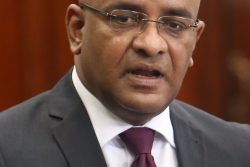Dear Editor,
I respond to the letter of an old interlocutor, Sherwood Lowe: “By ignoring the Coalition gov’t’s total parliamentary record Dev’s analysis is deficient and conclusions wrong.” (SN 9-19-22) He disputes my contention that the PNC opposition has been “historically indifferent to a “rule-based order” and constitutional change.” Ignoring the long durée of PNC’s rule between 1964 to 1992, he downplays my critique of the Granger administration reneging on its campaign promise on constitutional reform to radically alter the governance structure to share power “more equitably”. Instead, he cites several innocuous “reforms from the 1999/2000 constitution reform process” – such as amending the Integrity Act.
Promised for its “first 100 days” after May 15, 2015, all that was eventually done by 2018 was augmenting the Code of Conduct component. And then, as the new Chairman, Kumar Doraisami complained, never providing enough funding for the Committee to do its job. More than half of the Public Officials still had not complied with the filing requirements of the Act between 2018-2020. More germanely, Sherwood confuses my reporting on some empirical findings on two questions from the 2021 LAPOP Survey which pertained to our political conundrum. He mistakenly believes I see them as normative for Guyana. The first question was whether Guyanese preferred a political “system that guarantees access to a basic income and services for all citizens, even if the authorities cannot be elected” by them. As I reported, “The answer…was unequivocal: 65 percent of the population prefer a ‘guaranteed basic income and services even if no elections’. And that percentage went up among the young, poor and lesser educated.”
I simply summarised that data, inter alia equating “guaranteed basic income to “bread”, to say the majority of Guyanese – not me – want “bread rather than ballots”. Does Sherlock disagree with my statement of the finding? I am on record as insisting because of the changed demographics with no one ethnic group commanding a majority, either of the two ethnic-based party (PNC and PPP) can win elections by moderating their positions to attract cross-over votes or smaller parties with such votes. As I reiterated, this was how the PPP was checkmated in 2011, defeated in 2015 but won in 2020 after Mr. Granger’s decision to unilaterally shut down those sugar estates, rather than following his CoI’s suggestion. I now question the Opposition’s strident campaign about an “emerging apartheid state” from a standpoint of garnering cross-over votes.
On the second question of “leadership style” I merely reported, “On a related metric of measuring governance style, 57% of those surveyed – the highest in all the 22 countries surveyed – would prefer a “strong leader” in the government, even if the leader bends the rules to get things done. So what the vast majority of Guyanese want, ACCORDING TO THE LAPOP poll is a strong leader handing out bread, whether there are elections or not.” Does Sherwood disagree that’s what the poll said? Lastly, on President Ali’s leadership, again all I reported was that to the explicit LAPOP question, “How well is President Ali doing”: 41% African Guyanese; 53% Mixed Guyanese and 80% Indian Guyanese answered, ‘very good and good’.” Based on our last census that works out to a majority without even mentioning the 25% who were equivocal.
So does Sherwood disagree to my statement that evidently, “what the vast majority of Guyanese want, according to the LAPOP poll, is a strong leader handing out bread, whether there are elections or not”? At no time did I offer my assessment of the PPP’s program, which seems to be garnering majority support according to the LAPOP findings. My position, stated ad nauseum over 30 years, is that such a position is inherently dangerous because without a credible Opposition, such a government will ineluctably slide into an autocracy. I simply pointed out that our needed opposition has to craft another strategy since according to those findings, their present one (to May 2021) hasn’t worked. I commend to them all of Sherwood’s suggestions in his concluding paragraph.
Sincerely,
Ravi Dev





